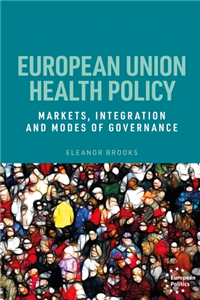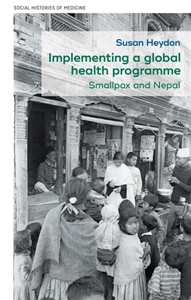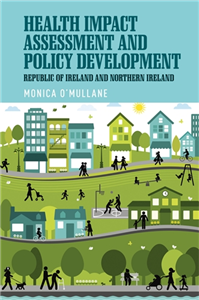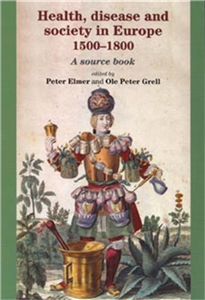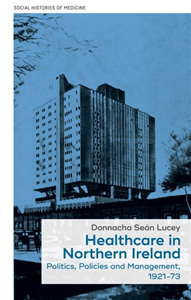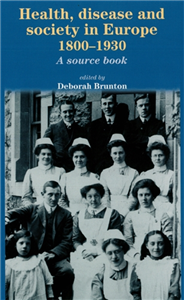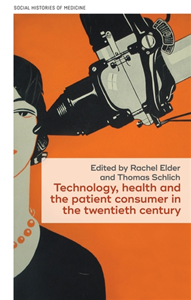Your Search Results
-
Wolters Kluwer Health
Wolters Kluwer Health is a leading global publisher of medical, nursing and allied health information resources in book, journal, newsletter, looseleaf and electronic media formats.
View Rights Portal
-
Promoted Content
The Geography of Health
The Spatial Dimension of Epidemiology and Treatment
by Jobst Augustin, Daniela Koller
This title is the first interdisciplinary book about geography and health that takes scientific methods and questions into account making it a great manual of international health geography research. The topics include: • spatial statistical analysis • mobility analysis in health research • GIS and mapping tools • cartographic visualization • health mapping • cancer epidemiology • morbidity • climate change and health – the example of Germany • global change and infectious diseases Target Group: Health scientists, geographers, doctors (epidemiologists)
-
Promoted ContentFilm theory & criticismFebruary 2014
The Encyclopedia of British Film
Fourth edition
by Edited by Brian McFarlane
With well over 6,300 articles, including over 500 new entries, this fourth edition of The Encyclopedia of British Film is a fully updated invaluable reference guide to the British film industry. It is the most authoritative volume yet, stretching from the inception of the industry to the present day, with detailed listings of the producers, directors, actors and studios behind a century or so of great British cinema. Brian McFarlane's meticulously researched guide is the definitive companion for anyone interested in the world of film. Previous editions have sold many thousands of copies and this fourth edition will be an essential work of reference for enthusiasts interested in the history of British cinema, and for universities and libraries.
-
 Trusted Partner
Humanities & Social SciencesMarch 2017
Trusted Partner
Humanities & Social SciencesMarch 2017Payment and philanthropy in British healthcare, 1918–48
by George Campbell Gosling, Keir Waddington
This book is available as an open access ebook under a CC-BY-NC-ND licence. At a time when payment is claiming a greater place than ever before within the NHS, this book provides the first in-depth investigation of the workings, scale and meaning of payment in British hospitals before the NHS. There were only three decades in British history when it was the norm for patients to pay the hospital; those between the end of the First World War and the establishment of the National Health Service in 1948. Payment played an important part in redefining rather than abandoning medical philanthropy, based on class divisions and the notion of financial contribution as a civic duty. With new insights on the scope of private medicine and the workings of the means test in the hospital, as well as the civic, consumer and charitable meanings associated with paying the hospital, Gosling offers a fresh perspective on healthcare before the NHS and welfare before the welfare state.
-
 Trusted Partner
April 2023
Trusted Partner
April 2023Compass Men's Health
Healthy, fit and potent at any age
by Dr. med. André Reitz
— The book on men's health — Confessions from a urologist — Compact, competent, concise Men are often unwilling to seek medical advice when they have problems. However, a lot of diseases can only be treated if they are detected in time. This book contains comprehensible and entertaining information on all the important questions relating to men's health, from the erection and its disorders, fertility and prostate issues, to sexuality in old age. The author knows what matters to men: he speaks from his experience as a urologist.
-
 Trusted Partner
Humanities & Social SciencesJuly 2025
Trusted Partner
Humanities & Social SciencesJuly 2025European Union health policy
Markets, integration and modes of governance
by Eleanor Brooks
The first book-length analysis of EU health policy since the COVID-19 pandemic, encompassing the creation of the European Health Union and the Recovery and Resilience Facility, this volume offers a timely and accessible analysis of the EU's health policy, institutions and governance. Focusing on the EU's health objectives and how they are pursued, it offers a detailed overview of the development of EU health policy, and five in-depth case studies of specific policy fields. The book will appeal to academic and policy audiences interested in the EU's health objectives and how it pursues them.
-
 Trusted Partner
Trusted Partner
-
 Trusted Partner
Trusted Partner
-
 Trusted Partner
MedicineFebruary 2025
Trusted Partner
MedicineFebruary 2025Implementing a global health programme
Smallpox and Nepal
by Susan Heydon
Worldwide eradication of the devastating viral disease of smallpox was devised as a distant global policy, but success depended on implementing a global vaccination programme within nation states. How this was achieved remains relevant and topical for responding to today's global communicable disease challenges. The small and poor Himalayan kingdom of Nepal faced enormous geographical and infrastructure challenges if it was going to succeed in a nationwide vaccination programme. This book acknowledges the key role of the WHO but disrupts the top-down, centre-led standard narrative. Against a background of widespread internal political and social change, Nepal's programme was expanded, effectively decentralised and a vaccination strategy introduced that aligned with people's beliefs. Few foreign personnel were involved.
-
 Trusted Partner
Humanities & Social SciencesJuly 2015
Trusted Partner
Humanities & Social SciencesJuly 2015Health Impact Assessment and policy development
The Republic of Ireland and Northern Ireland
by Monica O'Mullane
It is an accepted convention that non-health sector policies and strategies impact on population health. An instrument and approach, Health Impact Assessment (HIA), seeks to assess the health impacts of projects, programmes and policies in a systematic way. The ultimate goal of HIA is to inform public policy processes of these impacts. This book provides for the first time an analysis of how and why HIAs informed local policy development in both jurisdictions on the island of Ireland. An original theoretical framework was used as the analytical lens for this exploration, drawing from the fields of political and social sciences, and public health. The HIA projects were conducted on traffic and transport, Traveller accommodation, urban redevelopment and air quality. This conceptually-grounded guide draws from the disciplines of the political and social sciences and public health, and will appeal to academics, students and practitioners in these fields as well as policy-makers and planners at local and national government levels. ;
-
 Trusted Partner
Humanities & Social SciencesOctober 2016
Trusted Partner
Humanities & Social SciencesOctober 2016Medicine, health and Irish experiences of conflict, 1914–45
by David Durnin, Ian Miller
-
 Trusted Partner
Humanities & Social SciencesDecember 2003
Trusted Partner
Humanities & Social SciencesDecember 2003Health, disease and society in Europe, 1500–1800
A source book
by Isobel McLean
Considers how the body was viewed by the medical profession from the Renaissance to the Enlightenment, and challenges established ideas in the field of medical history. Examines the provision of medical care in context and how it was shaped by the social, religious, political and cultural concerns of the age. Arranged thematically and with brief but scholarly introductions, the selection of documents includes contemporary sources, recent research in the field and classical writings. Written in an accessible style by an Open University lecturer. Companion volume to The Healing Arts: Health, Disease and Society in Europe 1500-1800. ;
-
 Trusted Partner
Trusted Partner
-
 Trusted Partner
Trusted Partner
-
 Trusted Partner
Trusted Partner
-
 Trusted Partner
Trusted Partner
-
 Trusted Partner
MedicineMarch 2026
Trusted Partner
MedicineMarch 2026Healthcare in Northern Ireland
Politics, Policies and Management, 1921-72
by Donnacha Lucey
-
 Trusted Partner
Humanities & Social SciencesMay 2004
Trusted Partner
Humanities & Social SciencesMay 2004Health, disease and society in Europe, 1800–1930
A source book
by Deborah Brunton, Isobel McLean
During the nineteenth century, the provision of medical care underwent a radical transformation. In 1800, the body was still understood in terms of humours and fluids, and treatment was provided by a wide range of individuals, some of whom had little or no formal training. Institutions were marginal to the medical enterprise, and governments took almost no part in providing medical services. By 1930, however, a recognisably modern medicine had begun to emerge across Europe. New understandings of human physiology had resulted in the new science of surgical therapy; hospitals had become centres for care, research and training; and the newly organised medical professions increasingly sought to regulate medical practice. In most countries, the state had accepted responsibility for public health and the provision of basic welfare services. This volume provides readers with unrivalled access to a comprehensive range of sources on these major themes. Extracts from contemporary writings vividly illustrate key aspects of medical thought and practice, while a selection of classic historical research and up-to-date work in the field helps further our understanding of medical history. Thematically arranged, these sources are assembled to complement the essays in the companion volume, Medicine Transformed: Health, Disease and Society in Europe, 1800-1930. In addition, brief scholarly introductions make the sources accessible to both the specialist and the general reader. ;
-
 Trusted Partner
Trusted Partner
-
 Trusted Partner
MedicineNovember 2024
Trusted Partner
MedicineNovember 2024Technology, health and the patient consumer in the twentieth century
by Rachel Elder, Thomas Schlich
Technology and consumerism are two characteristic phenomena in the history medicine and healthcare, yet the connections between them are rarely explored by scholars. In this edited volume, the authors address this disconnect, noting the ways in which a variety of technologies have shaped patients' roles as consumers since the early twentieth century. Chapters examine key issues, such as the changing nature of patient information and choice, patients' assessment of risk and reward, and matters of patient role and of patient demand as they relate to new and changing technologies. They simultaneously investigate how differences in access to care and in outcomes across various patient groups have been influenced by the advent of new technologies and consumer-based approaches to health. The volume spans the twentieth and twenty-first centuries, spotlights an array of medical technologies and health products, and draws on examples from across the United States and United Kingdom.
-
 Trusted Partner
Medicine
Trusted Partner
MedicineEvolution and Health
How Do Lifestyle and Diet Inflence Medicine and Our Health?
by Nicole Bender, Lotte Habermann-Horstmeier (Eds.)
Today, we live in a new, anthropogenic environment that differs signifcantly from the environments to which we have adapted in the course of our evolution. This has signifcant effects on us humans, our health, and our social interaction. But how does the complex interaction between humans and the environment work from an evolutionary perspective? How does evolution affect our biology and behavior? What role do genetic and epigenetic aspects play here? And what inflence does this have on the development of diseases such as diabetes mellitus type 2, cardiovascular diseases, allergies, autoimmune diseases or mental disorders? The book attempts to provide answers to these complex questions and allows an exciting evolutionary view of our future with new approaches for individual lifestyle opportunities, but also for future public health measures.










